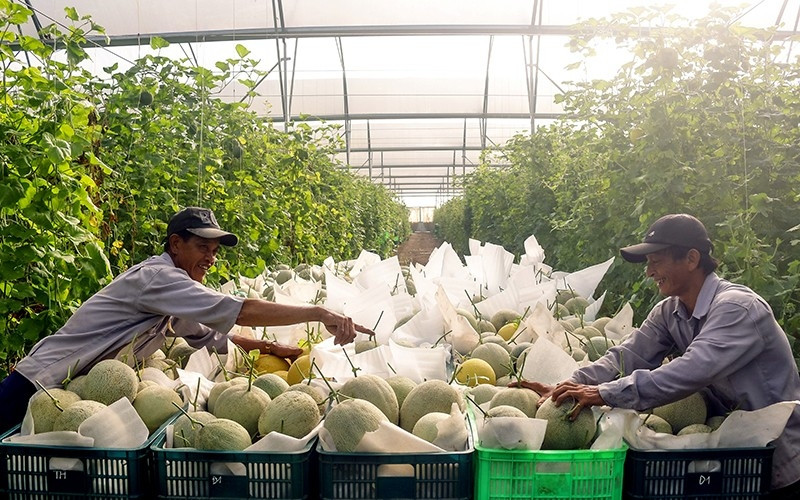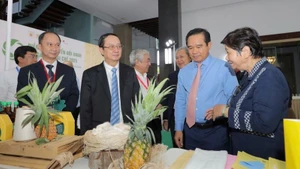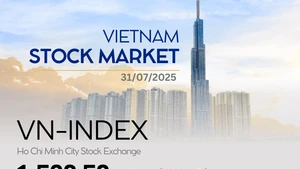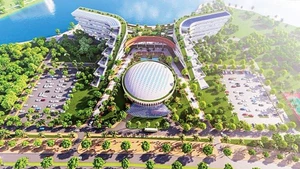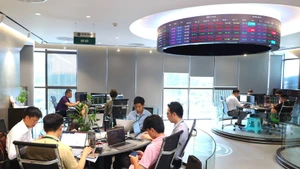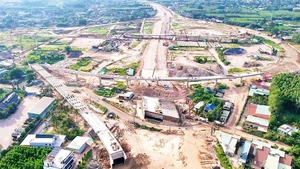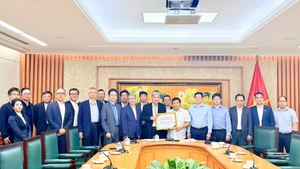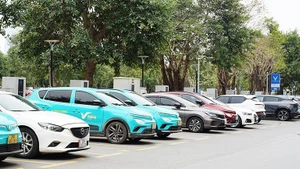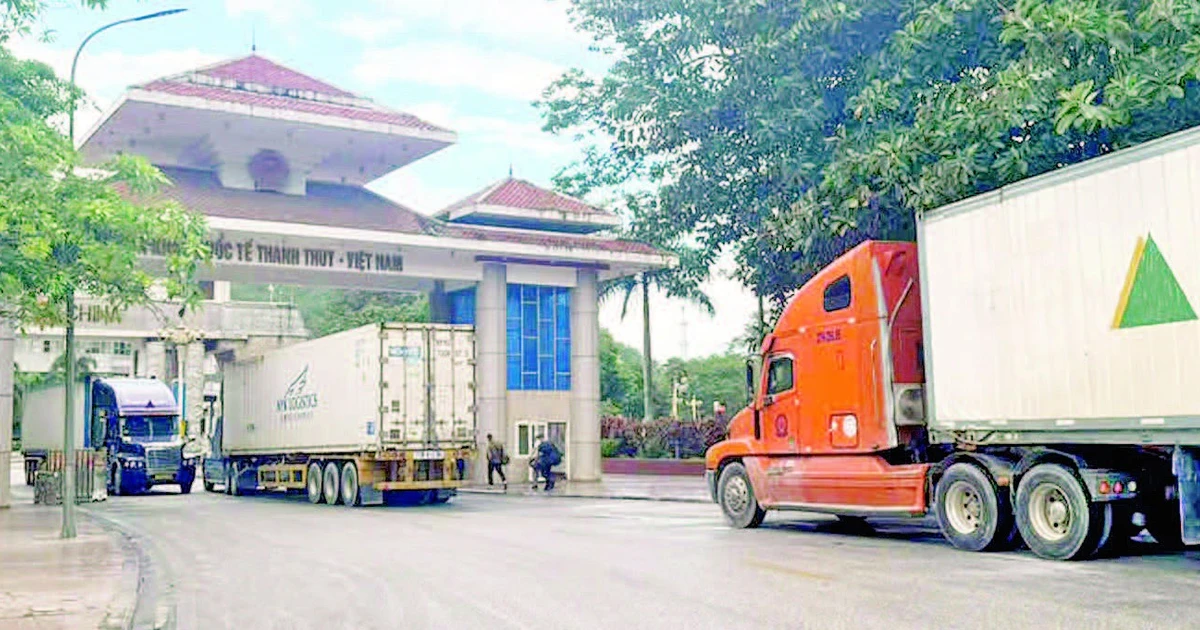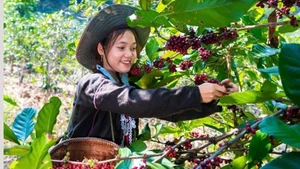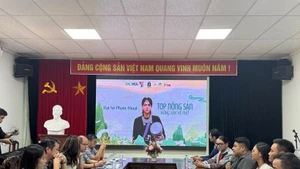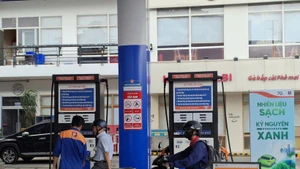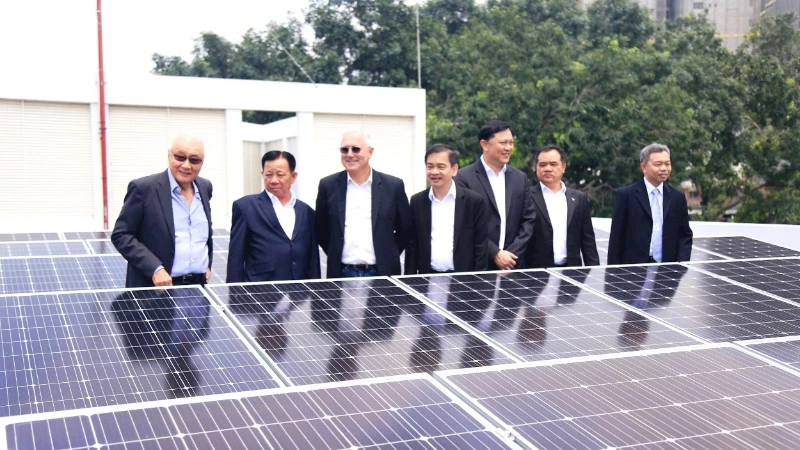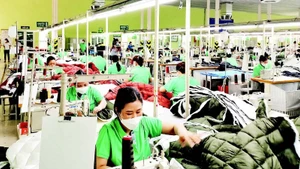The province has actively cooperated strongly and flexibly between science-technology and agriculture while synchronously deploying mechanisms and policies to support investments in science and technology development in the field of agriculture, and innovate many creative models and methods that bring high economic efficiency.
Spreading high-tech agriculture models
In 2009, U&I Agriculture Joint Stock Company (Unifarm), a member of U&I Group, started to invest in high-tech agriculture with An Thai Hi-tech Agriculture Park on a scale of 411 ha in the Phu Giao district.
Unifarm has grown crops of high economic value that are suitable for the market and capable of being replicated. Here, the two main models are growing cantaloupe in greenhouses with Israeli technology, automatically controlled by computers with GlobalGAP standards, which create/post 2 billion VND per hectare a year in revenue and also growing bananas for export to the Republic of Korea (RoK) and Japan which generates 500 million VND per hectare a year in revenue. Unifarm has created stable jobs for more than 500 workers inside and outside the province. Following the success of An Thai Hi-tech Agriculture Park, Unifarm has expanded into another project growing bananas for export with a scale of 1,300 ha in the Dau Tieng district.
Unifarm has also been consulting, transferring technology and connecting small-scale farmers to large-scale companies in Vietnam. Up to now, there have been nearly 30 individuals, groups and farms collaborating with Unifarm. Recently, in the middle of June 2022, Unifarm successfully started constructing a high-tech agriculture farm in Ha Nam province.
Unifarm products are increasingly popular and welcomed by the domestic and global market, especially cantaloupe first grown in Vietnam back in 2010 and then exported to Singapore for the first time in 2018. Moreover, Unifarm bananas are exported to the RoK and Japan. Noticeably, Unifarm was also selected by Dole, the world’s No.1 banana brand, to license this brand exclusively in Vietnam.
In Phu Giao district, the farm of Anova Agri Binh Duong Joint Stock Company with an area of 471ha has also been in operation since 2011. Up to now, the farm has applied high technology in dairy farming with advanced Europe management software to raise 1,500 high-yielding dairy cows that are pure and high-quality genetic lines from breeds from countries with advanced dairy husbandry such as Thailand, Australia and New Zealand. High-tech application from feeding, nurturing care, herd management, milking, environmental sanitation, and high-tech dairy farming has helped to improve excess cost management, reduce unnecessary costs, and ensure environmental safety and the quality of the raw milk.
General Director of Anova Agri Binh Duong Joint Stock Company Nguyen Thanh Trung said raising dairy cows in the direction of high technology and advanced breeding techniques will lower production costs, and the quality of exploited milk will always be stable at a higher level thanks to strict management of nutrition, milk exploitation, preservation of raw milk after milking, together with hygiene and safety from diseases.
Since then, the purchase price of raw milk at the hi-tech farm was always higher than that of conventional livestock producers. In addition, the 200ha farm of Vinamit Joint Stock Company has pioneered organic standards (organic agriculture), certified by Organic USDA (US Department of Agriculture) and Organic EU (European Union) standards as the most organic food in terms of clean food, clean processing and clean growing environments since 2016. Currently, Vinamit organic products feature different kinds of vegetables, tubers and fruits consumed well in domestic and global markets.
Chairman of the Board of Directors of Vinamit Joint Stock Company Nguyen Lam Vien, said: Food preservatives and additives, food preparations, flavourings or colourants must not be used during the processing and handling of organic products. These products must be produced completely organically to ensure organicity from farming, handling, processing, packaging, and storage to consumers.
According to the Department of Agriculture and Rural Development of Binh Duong province, to attract and encourage the development of high-tech agriculture and high-tech agricultural regions, the province has a policy of lending high-tech agricultural capital with about 70% of the minimum loan interest rate of Binh Duong Investment and Development Fund, preferential loan limit from 80-90% depending on the size of the agricultural production investment plan in the direction of high technology application.

Citrus garden in accordance with VietGAP standards brings high efficiency for farmers in Bac Tan Uyen District.
As a result, up to now, Binh Duong has about 6,370ha of high technology applications in cultivation, with 189 hi-tech chicken and duck farms and 251 pig farms. Director of Binh Duong Department of Agriculture and Rural Development Pham Van Bong said: Along with the preferential lending policy, since 2008, Binh Duong has called for the establishment of a hi-tech agricultural zone as the nucleus for development.
Up to now, the province has four large-scale high-tech agricultural zones operating efficiently, such as Tien Hung Hi-tech Agricultural Park (Bac Tan Uyen District), the Hi-tech agricultural zone (Phu Giao District) of Anova Agri Binh Duong Joint Stock Company, the Hi-tech agricultural zone in Tan Uyen town and An Thai hi-tech agricultural zone. These hi-tech agricultural zones are planned as large-scale production areas, facilitating the concentration of resources and means of production, and contributing to promoting the development of high-tech agriculture.
“Lever” to develop high-tech agriculture
According to Chairman of the Board of Directors of U&I Group Mai Huu Tin Unifarm’s An Thai Hi-tech Agricultural Park has applied modern technology in agricultural production for outstanding quality and productivity to create a prestigious brand bringing high socio-economic efficiency.
The agricultural zone is also a centre for technology transfer, construction, and market development, helping the surrounding farms and households to become satellites of technical production and underwriting contracts of the zone in a way that advanced countries have done successfully. He also shared that agricultural credit still faces many difficulties due to strict regulations on collateral, while the largest investment is in the field. So we need more liberal regulations.
Controlling the cost of agricultural inputs, especially fertilizers, is very important to ensure national food security. As a result, developed countries still limit fertilizer exports when necessary. Therefore, Vietnam needs a similar mechanism to avoid scarcity of fertilizers and increase domestic prices while nitrogenous plants in Vietnam can still export and earn large profits.
According to Assoc. Prof. Dr. Ngo Thi Phuong Lan, University of Social Sciences and Humanities (National University of Ho Chi Minh City), in the coming time, Binh Duong province needs to focus on developing high-tech agriculture associated with a circular economy, developing high-tech agriculture along the agricultural value chain and agritourism.
Assoc. Prof. Dr. Vo Van Thang, Rector of An Giang University (National University of Ho Chi Minh City) said that the application of hi-tech agriculture in Binh Duong has developed very early but is facing many difficulties in expanding production and diversifying types. High-tech agriculture is also affected by market factors and high investment costs, so it lacks diversity and is vulnerable.
In order to overcome this limitation, Binh Duong hi-tech agriculture needs to consider applying the model flexibly, which, applies high technology partially and based on an open traditional farming platform. This option does not require a lot of capital, while still ensuring product quality standards according to market demand.
